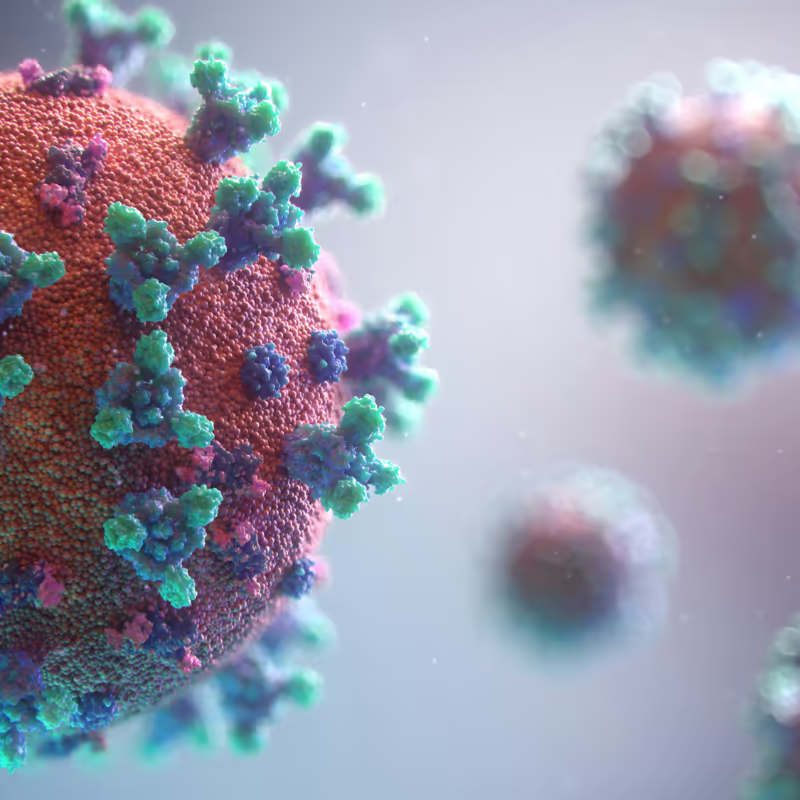Viral Respiratory Infections in Children
Viral respiratory infections are among the most common illnesses in children and a major cause of coughs, colds, and breathing difficulties, particularly in babies and young children. While most are mild and resolve on their own, some infections can lead to more serious problems, especially in children with underlying health conditions.
What Are Viral Respiratory Infections?
Viral respiratory infections are caused by viruses that affect the nose, throat, airways, and lungs. They can range from simple colds to more serious illnesses like bronchiolitis or viral pneumonia.
Common viruses that cause respiratory illness in children include:

- Rhinovirus (common cold)
- Respiratory Syncytial Virus (RSV)
- Influenza (flu)
- Parainfluenza viruses (can cause croup)
- Adenovirus
- Enteroviruses
- Human metapneumovirus
- COVID-19 (caused by SARS-CoV-2)
Who Is at Risk?
Viral respiratory infections can affect children of all ages, but the following groups are at higher risk of complications:
- Babies under 12 months, especially those under 6 months
- Children born prematurely
- Children with asthma or chronic lung disease (e.g. bronchopulmonary dysplasia)
- Children with heart defects or weakened immune systems
Symptoms of Viral Respiratory Infections
Symptoms can vary depending on the virus and your child’s age. Common symptoms include:
- Runny or blocked nose
- Cough
- Fever
- Sore throat
- Sneezing
- Wheezing or noisy breathing
- Difficulty feeding (especially in babies)
- Fast or laboured breathing
- Irritability or fatigue
Most viral infections follow a typical pattern: symptoms peak around day 2–3 and improve by day 5–7. Cough may persist for several weeks.
Common Types of Viral Respiratory Infection
1. Common Cold
- Usually caused by rhinovirus
- Mild symptoms: runny nose, sneezing, sore throat, mild cough
- No specific treatment; supportive care at home is usually enough
2. Bronchiolitis
- Most common in babies under 1 year
- Usually caused by RSV
- Symptoms: persistent cough, wheeze, fast breathing, feeding difficulty
- May require hospital admission if breathing or feeding is significantly affected
3. Croup
- Typically caused by parainfluenza virus
- Barking cough, hoarse voice, stridor (noisy breathing when inhaling)
- Often worse at night; may require steroids or hospital review
4. Viral Pneumonia
- Can be caused by RSV, influenza, adenovirus or others
- May cause high fever, breathing difficulty, low oxygen levels
- Hospital treatment may be needed in severe cases
5. Influenza (Flu)
- Sudden onset of high fever, body aches, cough, fatigue
- Can lead to complications like pneumonia
- Annual flu vaccination is recommended
When to Seek Medical Help
Most children recover from viral respiratory infections with rest, fluids, and time. However, seek urgent medical attention if your child has:
- Difficulty breathing or breathing very fast
- Pauses in breathing (apnoea)
- Blue lips or tongue
- Very high fever or persistent fever
- Reduced feeding or signs of dehydration (dry mouth, less wet nappies)
- Is very sleepy or difficult to wake
- Grunting or pulling in of chest/neck muscles when breathing
- Wheezing or noisy breathing that is getting worse
How Are Viral Infections Diagnosed?
In most cases, diagnosis is made based on symptoms and examination. Tests are rarely needed. If symptoms are severe or your child is in hospital, your doctor may perform:
- Nasal swab to identify the virus
- Chest X-ray (if pneumonia is suspected)
- Oxygen monitoring (pulse oximetry)
- Blood tests (if infection is severe or unclear)
Treatment and Management
There is no cure for viral respiratory infections, but treatment focuses on supporting your child while their immune system fights the virus.
Supportive care may include:
- Paracetamol or ibuprofen for fever or discomfort
- Encouraging fluids to prevent dehydration
- Saline nasal drops or spray for blocked nose
- Gentle suctioning (e.g. with a bulb aspirator for babies)
- Keeping your child upright and calm to help with breathing
- Monitoring for signs of deterioration
Antibiotics are not effective against viruses and are not routinely recommended unless there is a secondary bacterial infection.
In more serious cases, hospital treatment may include:
- Oxygen therapy
- Nasogastric feeding if your child is not feeding well
- Nebulisers or inhalers if wheeze is present
- Antiviral medication (e.g. for severe flu or COVID-19 in at-risk groups)
Prevention
- Handwashing is the best way to reduce spread of viruses
Avoid close contact with sick people - Flu vaccination is recommended yearly for children aged 2 years and older
- RSV immunisation (e.g. nirsevimab or palivizumab) may be offered to high-risk infants during RSV season
What to Expect and Recovery
- Most viral infections resolve in 3 to 7 days
- Cough can last 1–2 weeks and does not always mean something serious
- Children with underlying lung conditions may need closer monitoring and early treatment for flare-ups
If you are concerned about your child’s breathing, cough or recovery, speak to your GP or paediatric respiratory team.
We provide specialist assessment for children with persistent respiratory symptoms or frequent
Located in London | Infants to young adults seen
Request a referral or book an appointment with Professor Gupta today.
